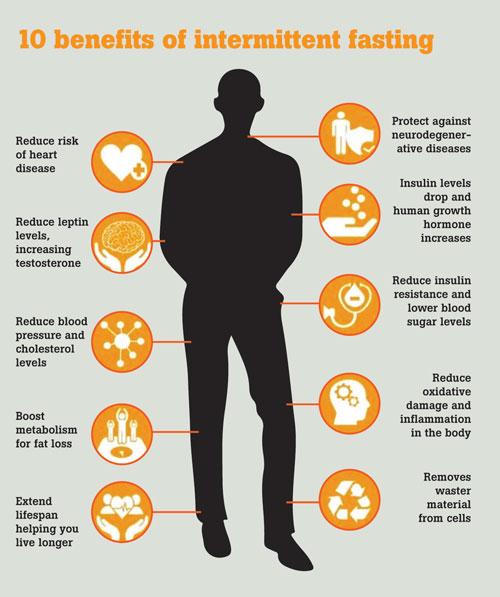21 Feb 2020 - {{hitsCtrl.values.hits}}
 In all honesty, the word “fasting” doesn’t exactly bring up delicious thoughts and positive vibes. For many people, it most likely associates with words such as starvation and food deprivation.
In all honesty, the word “fasting” doesn’t exactly bring up delicious thoughts and positive vibes. For many people, it most likely associates with words such as starvation and food deprivation.
Yet, intermittent fasting has so many folks going wild these days, raving about how this easy method of fasting helped them lose weight and improve their health. With hopes of introducing this diet and its pros and cons, Daily Mirror spoke to Dr. Subash Mendis, Head of Food Safety Promotion Unit of the Municipal Council in Colombo.
Accordingly, intermittent fasting helps reduce LDL cholesterol levels and cardiovascular risk. Furthermore, he said that some research suggests that this helps with diphenic control of diabetes
What is intermittent fasting?
Dr. Mendis defines Intermittent Fasting as a method of periodic fasting combined with small periods of eating windows. Accordingly one should fast every day for a certain period.
However, it doesn’t specify which foods you should eat, but rather when you should eat them. Therefore, there is no calorie restriction. In this respect, it’s not a diet in the conventional sense, but more accurately described as an eating pattern.
Evolutionary adapted for Intermittent Fasting
According to Dr. Mendis, fasting has been a practise throughout human evolution. Ancient hunter-gatherers didn’t have supermarkets, refrigerators or food available year-round. Sometimes they couldn’t find anything to eat.
As a result, humans evolved to be able to function without food for extended periods of time. Moreover, Dr. Mendis emphasised that intermittent fasting was being practised among almost all religious communities including Islam, Christianity, Judaism and Buddhism.
“These things suggest that our body has been biologically designed to fast for prolonged period of time and our hormones are evolved for that,” explained Dr. Mendis.
Fasting methods
According Dr. Mendis there are several methods of intermittent fasting that are popular among people.
Effective Method of Weight loss
Intermittent Fasting could be a very effective method of weight loss. Dr. Mendis opinions that the major benefit of Intermittent Fasting is that it enhances the activity of fat burning hormones.
“For an example, it enhances the activity of Growth Hormone almost by 50%. This hormone increases our muscle mass and helps in fat burning,” he said. Moreover, he said it increases testosterone levels in males by 50-60% and increases activity of hormone sensitive lipase, both of which are major fat burning hormones. Intermittent Fasting also suppresses the activity of major fat storing hormone, Insulin.
Dr. Mendis emphasised that fasting was the best method for weight loss as there was no expense in terms of medication and positive results could be easily obtained when practised properly.
Benefits of Intermittent Fasting
Other than weight loss, there are many other benefits of Intermittent Fasting. For an example, Dr. Mendis said it has been proven through research that it promotes longevity.
Longevity is achieved by enhanced autophagy. Autophagy is the body’s way of getting rid of damaged cells, in order to regenerate newer, healthier cells. According to Dr. Mendis, Intermittent Fasting enhances autophagy which in turn enhances longevity. In addition, practising intermittent fasting helps in detoxification. Dr. Mendis said that several research shows that this method improves heart health. Accordingly, intermittent fasting helps reduce LDL cholesterol levels and cardiovascular risk. Furthermore, he said that some research suggests that this helps with diphenic control of diabetes.
People who shouldn’t fast
In Dr. Mendis’s expertise, there are some people who shouldn’t fast. For an example, Type 1 Diabetes patients and poorly controlled Type 2 Diabetes patients should not practise intermittent fasting. Moreover, those with severe gastritis with gastric ulcers should not fast either.
However, after consulting a medical person, these people may be able to adapt to a fasting method which ideally suits them. If you’re underweight or have a history of eating disorders, you should not fast without consulting a health professional first. In addition, pregnant women, females who are breast feeding and women who have issues with fertility and who are trying to conceive should take medical advice before practising intermittent fasting.
Things to be mindful of
“When practising intermittent fasting, it is essential that one eases into it gradually without straight away fasting for days,” Dr. Mendis warned. In his opinion, it is better to consult a medical professional before one starts intermittent fasting.
Moreover, it is essential that all necessary nutrients are obtained through one’s diet when practising intermittent fasting. Some people may experience loss of hair, weakened teeth and nails and unhealthy skin when practising intermittent fasting. This is due to vitamin deficiencies.
”I strongly advice these people to have a balanced diet with more vegetables,” Dr. Mendis advised. Furthermore, some people who practice intermittent fasting may experience less energy. This would happen only if one does not obtain the required amount of calories through the diet. To avoid these issues, Dr. Mendis believes that one should always refer to a nutritionist when planning the diet.
However, Dr. Mendis is strongly against the common notion that intermittent fasting causes less productivity. According to him, a person’s sympathetic nervous system is stimulated by intermittent fasting, which promotes energy generation. Therefore, he believes that intermittent fasting could be beneficial, increasing one’s productivity, even for those who engage in high energy consuming jobs like being a sportsman. Accordingly, Dr. Mendis believes that when intermittent fasting is practised properly under medical guidance, no harm is caused.
“I fast for 24 hours every week and I have never felt better,” he said.
21 Dec 2024 4 hours ago
21 Dec 2024 21 Dec 2024
21 Dec 2024 21 Dec 2024
21 Dec 2024 21 Dec 2024
21 Dec 2024 21 Dec 2024